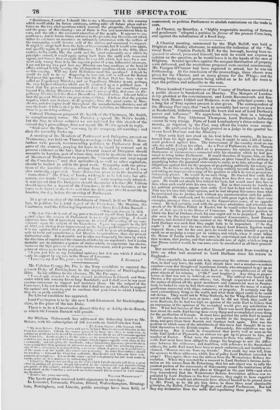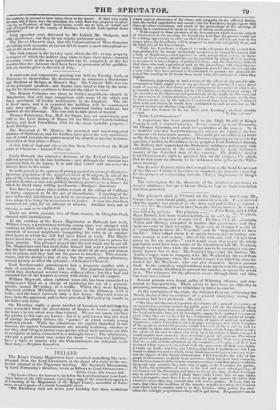Three hundred Conservatives of the County of Durham assembled at
. a public dinner in Sunderland on Monday. The Marquis of London- ti,rry presided at the entertainment, and Lords Ravensworth and Sea- ham, With Messrs. Liddell and Hodgson, were the principal guests; but a long list of Tory squires present is also given. The correspondent of the Morning Pow says, that " such an assembly had never yet been seen at Sunderland, hitherto considered the heart and seat of Lord Durham's power and influence." We apprehend, however, that in a borough returning the Tory Alderman Thompson Lord Durham's influence cannot be very stroug. Parts of Lord Londonderry's three-column rig. marole, as reported by the Post, may afford the reader some amuse- ment, lle professed to take high ground as a judge in the quarrel be- tween Lord Durham and the :Ministry-
" '1'hat noble Earl now stood on his triad before the country. Ile has re- turned from Lis high positiou. There was, it might be said, a bill of indict- meut preferred. against him. The Goverment of the country stood on one side, the noble EMI on the oilier. As a Peer of Parliament, lie (tine Marquis of Londonderry) might he called on to pronounce his opinion on those great disclosures of circumstances connected with his situation which he had pro- mised to bring before Parliament. It would therefore ill become bini, un that
particular question to give any public opinion, or place himself in the attitude of prejudging before the promised statements he made, or to take advantage of the allegations against hint for the purpose of prejudicing politically his county pa- bition. To the this would, he thought, be acting unfairly towards the noble Earl, tind taking am in/proper ativandage of the position in which he was at present un- fortunately placed. . lie woold -du no smelt thing. He trusted that noble Earl should never have to complain of any thing limn him that seas not fair and open. lie would not attack him behind his back, but would meet him face to thee, when cacti could state his own views. But in that county he would, on
his t
political principles oppose that noble Earl foot to foot and inch to inch. This was Lis own individual opinion, and he had adopted this course from what Inc considered due to justice, and withuut any communication with his politi- cal friends. He confessed, and he confessed with great regret, that there were examples' amongst those attached to the Conservative cause, of an opposite course. Ile had certainly read with the greatest adminition and attention the speech of .Sir William Follett at Exeter, but he would rather have heard one part of that speech in the House of Commons. In the peculiar position to which the Earl of Durham stood, his case ought not to be prejudged. Ile bad ttlso seen by the papers that another eminent Conservative, .Lord Francis Egerton, had declared that the condi-let of the Whig-Radical Government and Lord. Durham was such that they ought both to be impeached. (" So they ought.") If such were the case, then he hoped Lord. Francis Egerton would impeach them ; but for his own part, he would not make himself a party to speak on or prejudge udge a cause yet n embryo, and which' when it came before the House of Lords, would, he was sure, be entertained and decided on with that wisdom, that justice, and that inter/mina/de love of right, which so long as that House existed would, be was sure, ever be manifested in all their proceed- ings."
lint nevertheless, he did not feel himself precluded from touching a little on what had occurred to Lord Durham since his return to England- " More especially, he could not help expressing his extreme astonishment, that, in that very town, the noble *Earl should have met a number—a certain number—very few thought—of' injudicious friends, who attempted to get up an address of congratulation to the noble Earl on the accomplishment of all the great objects of his mission. (" Ok !" and laughter.) Any thing so prepos- terous us that was not, he believed, un record. The address was headed by a Doctor, a few agents, and SOW others; but, though acquainted at least with the names of almost all the great merchants and commercial nien in Sunder- land, he looked in vain to find their HMOS; nor did be see the name of a single gentleman connected with ships, commerce, or property. It certainly was the most extraordinary thing in tine world, and what their object could be lie could not divine. They could not be Whig-Radicals, for the Whig-Radical Govern- ment and the noble Earl were at issue; and he did not think they could he lucre Radicals, 1hr he had too high an opinion of the noble Earl to believe that an expression of the opinions of the unwashed would give any satisfaction to him. What had become of this address? There was much flourish and born. bust about the noble Earl having done every thing and accomplished every thing fur the pacification of Canada. It must have puzzled the noble Earl to answer it, Of course, lie answered as nearly as possible in the language of the ad- dress, and gave them their flourish anti bombast back again. This was the position in which some of the inhabitants of this town had thought fit to ex- hibit themselves to the British empire. Fortunately, this exhibition was not followed up. But it would be remembered that pretty well as soon as the noble Earl larded tit Plymouth, an address was got up to present to hitu, and another at Exeter. What were the answers to those two addresses? The noble Earl must have been obliged to change the language to suit the differ'. CMS: between the addresses; and doubtless, with reference to the Sunderland address, the noble Earl must have been its notch embarrassed, and doubtless ex- claimed, Heaven save time from my friends,' Now could any man tell, from the answers to those addresses, which line of policy Lord Durham intended to adopt ? Then again, there was the address from the Westminster Reform A.EI sot:idiom When they reverted for a moment to Lord Durham's famous decla- ration on his return from St. Petersburg, that his sole object was to rally time greatest portion of the community of this country round the institutions of the country, and also to what took place at Glasgow in tine year 1834—and when they remembered that the Westminster Reform Association address was re- fudiated by Lord Durham in the first instance, they ought to have expected rom him that he would not afterwards have allowed himself to he pinned dowu by Mr. Prout, as he did pin bins down, to those three most abominable principles, the Ballot, Universal Suffrage, and Annual Parliaments. Nor had they any declaration from the noble Earl repudiating those principles. On
the contrary, he seemed to have taken them to his bosom. if that were really.
the case, and if those were the principles the noble Earl was prepared mix°, rate, he, as President of that Association, would say to hun on behalf not only of himself but of the county of Durham, war to the knife against those principles."
Long speeches were delivered by Mr. Liddell, Mr. Hodgson, and other gentlemen ; but they do not require particular notice.
The Dorset Moak& says, that the Conservatives of West Somerset are taking such measures as cannot fail to insure a most triumphant re- sult at the next election.
The 30th instant is the last day upon which the title to any property in respect of which the holders may claim to have their names inserted as county voters at the next registration can be completed, as the Act requires that the claimant shall have been in possession of his qualifica- tion six mouths prior to the 31st of July.



























 Previous page
Previous page